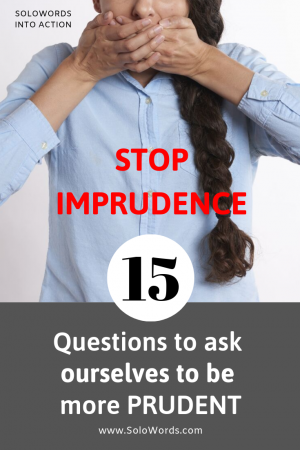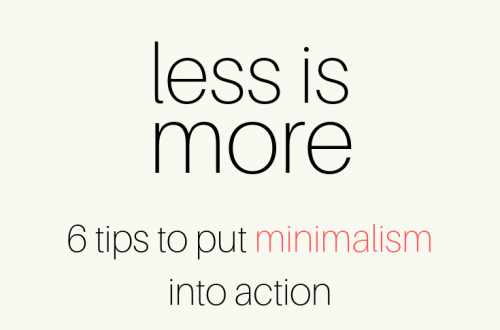
Stop imprudence: 15 questions to ask ourselves to be more prudent
Stop imprudence, but how? A few weeks ago, on a beautiful night at the beach, I was having a drink with five of my girlfriends. One of them started a game that consisted of telling each friend her best quality in one word and why. Some people don’t like to play this kind of games, because they don’t like to be put on the spot in front of others. Other people like to play these games because it is a way to know how people see them and viceversa. So, there we were. One by one, we started telling each friend the best quality we see in them. For one of my friends, I choose the word “prudence” because, in my opinion, she is the total representation of that virtue in the way she talks and acts.
While reading and thinking about the word prudence, it came to my mind that we may not realize when we are prudent, but most of the time we do know when we are imprudent. When this happens, we usually feel bad, ashamed, embarrassed, guilty, or all of the above. I am very sure all of us have had any of those feeling when screwing up.
I truly admire my friend for her quality of prudence. For this reason “prudence” is the next word to put into action.
What is the meaning of the word "prudence"?
One of the best definition I found for prudence is in Collins Dictionary:
Prudence is care and good sense that someone shows when making a decision or taking action.
We can notice that there are two important words on this definition: care and good sense.
In this case, care is to know when and how to act without hurting anyone, and to always think about of the well-being of everybody.
Good sense is the ability to make the right decision about something.
When should we practice prudence?
Prudence is considered a virtue, which according to Collins Dictionary is thinking and doing what is right and avoiding what is wrong. So ideally we should exercise prudence in everything we think, everything we say and everything we do.
What we think:
On my previous post about self-control, I talked about the importance to change our thoughts so we can control our emotions. Now that I am talking about prudence, I realized it is our thoughts which can make us prudent. To be prudent, we need to think before acting. If we don’t think or don’t pay attention to our thoughts, we are at a high risk to be imprudent.
What we say
What we say or not say is the most common way to show prudence and the easiest way to screw up. There is a saying I use a lot in Spanish that says “calladita me veo mas bonita” which means “I look more beautiful when my mouth is shut”. Meaning , we need to be very careful with what we say, how we say it, the moment we are saying it, and to whom we are saying it. Being very careful means to think or pay attention to our thoughts before we open our mouth to say something. A lot of times, we say things without thinking, and this is what can make us imprudent. My husband uses another saying that relates to this. “God gave us a filter between our brain and our mouth. We must use it.”
What we do
What we do represents action and is another way to show prudence. Doing something without thinking about the consequences even though we know them is considered an imprudence. This means that a lot of the stupid things we do are an act of imprudence. Acting in an imprudent way can lead us to negative and even dangerous consequences.
9 examples of imprudence:
1. Assuming things without knowing:
Seeing a woman with a big belly and asking “When are you due?” or “Oh, Congratulations! I didn’t know you were pregnant.”
2. Trying to be empathetic:
Telling someone with cancer, “Oh, I am so sorry you are going through this. My co-worker had the same kind of cancer, and it was awful, she passed away after two years battling.”
3. Blaming someone without an actual proof:
Telling a neighbor, “Your kid broke my window. I am very sure he did it with his ball. I don’t want to see him around my house anymore.” Then we realized it was our own kid who did it.
4. Desperation or nervousness:
Adding an inappropriate comment to break the silence during a work meeting like “Wow, everybody looks tired today, do you have the same hangover as me?”
5. Gossip:
Telling a friend, “Did you know that Kim is getting divorce? I think the husband was cheating on her.”
6. Criticism:
In a work meeting saying, “The new receptionist is terrible, and the way she dresses is horrible.”
7. Talking too much:
In a party with too many drinks it is very common to loose our filter. Saying too much about our intimate or private life could be an imprudence.
8. Social Media:
Posting crazy or stupid things we think or do on any social media could also be imprudence.
9. Doing wrong things and knowing the consequences:
- Drinking and driving
- Cheating on a test
- Don’t have a mammography every year after 40
- Buying something expensive when there is not enough money to pay the rent
4 Consequences of not being prudent
We have to stop imprudence. Besides negative feelings like embarrassment, shame, and guilt, there are also other kind of negative consequences that can affect not only ourselves but most importantly, others.
- Closing doors to opportunities. i.e., Talking more than we should or making irrelevant comments on a job interview or while networking.
- Damaging relationships. i.e., Telling a friend something you were not sure about or sharing a secret from someone else.
- Physical consequences. i.e., Eating something you know you shouldn’t and getting sick
- Legal consequences. i.e., Drinking and driving
5 Steps to practice prudence
1. Internal deliberation:
As I said before, thinking is crucial to be prudent. Questioning ourselves about what we are going to say or do is the best way to create an internal deliberation. This makes us think about people, context, content, and consequences for saying or doing something.
2. Focus on what we know:
To be prudent, we can only use the information we have through memories, experience, and knowledge. This information should be funded. We have to understand that gossip doesn’t count as funded information or knowledge.
Rules of thumb when we are going to talk about someone:
- If we don’t have all the information, knowledge and proofs about something, it is better not to say or do anything
- If we have nothing good to say about someone, don’t say anything
- We never know everything about a story. In every story, there are always two sides, and usually, we only know one.
- Never blame someone for doing something if you don’t have proofs.
3. Put awareness into action:
We have to be aware of what is going on around us and who is around us. Using all our senses to get more information about the situation and the people around us is an essential part of being prudent. It can be easy to be imprudent because we didn’t pay attention to what was going on. (Read my post about Awareness is the Key to Everything)
4. Decide:
After we have our internal deliberation, complemented with what we know from memories, experience, knowledge, and awareness, then we decide what are we going to say or do.
5. Take action:
Whatever we end doing, in different situations, is what shows our prudence. Action means doing or not doing something and saying or not saying something. If we don’t follow the steps and end up being imprudent, let’s recognize it and take action to rectify or apologize. It is always better to say sorry than saying nothing.
15 questions to ask ourselves to be more prudent:
- Is this the right moment and place to talk about this or to do this?
- What I am going to say is too personal?
- Is appropriate what I am going to say or do?
- If I share this information about someone else, is that person going to be ok with it?
- Am I allowed to tell this to somebody else or was a secret from someone that trust me?
- Am I allowed to do this? Is it legal, moral?
- Would I like to hear what I am going to say if someone says it to me?
- Am I going to blame or point my finger at someone without funded proofs?
- Has this person asked me for my opinion or advice?
- What am I going to say or do sum or rest?
- Do I know the other side of the story?
- Am I presuming of a favor I did or help I gave to someone?
- Am I talking more than I should?
- Am I going to talk about someone who is not present?
- What can happen if I say this or do that?
Conclusion:
We all commit acts of imprudence every now and then, and when we realized it, we feel horrible. We also notice when people are not prudent, and we also feel bad for them. What can we say when our kids are imprudent, then we want to kill ourselves. Being imprudent is human, but we should pay extra attention because it can hurt other people and ourselves.
Prudence is about thinking, caring, good sense, and awareness. To put prudence into action, we can start by being very careful with the words that come out of our mouth when we are going to talk about someone. Let’s remember that we own our words until we say them. I have to recognize that a lot of my imprudence comes from talking more than what I should, so I know I have some work to do to stop imprudence.
Do you know what quality my prudent friend choose for each of us that night at the beach? Instead of going one by one, she decided to talk about friendship and the importance we all had in her life. She didn’t point at any of us with a quality label. She thanked us as a group for being her friend with the good qualities all of us have. After listening to her answer, I just had to say “brilliant prudence, my friend.”
For my dear friend, please keep giving us master lessons of prudence.
Here are two questions for you:
- What was the worst imprudence you have committed or witnessed?
Here is a link to Virtue First Foundation which has an excellent article about the Virtue of Prudence in case you want to read more about it.
Easy to download, high resolution image to print at home or favorite local or online print shop in any of the following sizes: 5 x 7, 8 x 10, 11 x 14, 16 x 20 and 18 x 24. To download, click the green bottom bellow.



You May Also Like

Less is more: 6 Tips to put minimalism into action
October 9, 2019
Do you need a pencil? 12 Tips to Smile More
July 17, 2019